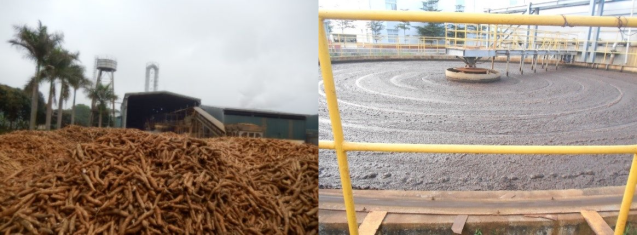Sowing the seeds of sustainable bioenergy

The implementation of indicators for the use of bioenergy in Paraguay and Viet Nam provides useful lessons on sustainable country-specific bioenergy pathways.
Upon the conclusion of the IKI-project “Building capacity in the use of the Global Bioenergy Partnership (GBEP) indicators for sustainable bioenergy” in April 2018, the successful testing of GBEP indicators for a sustainable use of bioenergy has paved the way for establishing viable policies and actions for sustainable bioenergy development with regard to country-specific bioenergy pathways in Paraguay and Vietnam.
The Global Bioenergy Partnership (GBEP) had previously produced a set of 24 indicators for the assessment and monitoring of bioenergy sustainability at the national level. The GBEP indicators are intended to help policy-makers evaluate the environmental, social and economic sustainability of the bioenergy sector in their country and guide them towards policies that foster sustainable development.
The Food and Agriculture Organisation of the United Nations (FAO), which is among the founding members of the Global Bioenergy Partnership, implemented the indicators in Paraguay and Vietnam, supported by the International Climate Initiative (IKI) of the German Environment Ministry (BMU).
The project focused on two bioenergy pathways in each target country, with the pathways determined through a participative and cross-cutting approach involving both the public and private sectors as part of a Multi-Stakeholder Working Group (MSWG). The priority pathways identified for Paraguay were forest biomass for energy at both the household and industrial levels, and ethanol from maize and sugarcane. For Viet Nam they were biogas at the household, farm and industrial levels, and cassava-based ethanol. Project activities were implemented by target-country national research institutions, which received continual support and technical guidance from FAO experts.

The project contributed to the establishment of national platforms for the long-term monitoring of bioenergy sustainability in Paraguay and Viet Nam. With these in place, it is possible to assess the contribution that modern bioenergy makes to climate change mitigation and sustainable development and thus to the implementation of the Nationally Determined Contributions (NDCs) and the Sustainable Development Goals (SDGs).
The project fostered constructive dialogue among policy-makers, the private sector, civil society and academia, and it raised stakeholders’ awareness of the main sustainability issues and the importance of monitoring the impacts of bioenergy production and use over time. The implementation of the GBEP indicators in the two countries also promoted the exchange of good practices at the regional level and paved the way for future cooperation between the two countries.
Local research institutions benefited from the project by building their capacities to draw up new project proposals, based on the experiences gained in measuring the GBEP indicators, for submission to potential donors. The Universidad Católica Nuestra Señora de la Asunción (UCA), which led the process to measure the economic indicators in Paraguay, has set up a new university course on bioenergy and has independently begun implementing GBEP indicators for the biodiesel pathway in Paraguay.
At the technical level, the project highlighted that, to improve the sustainability and competitiveness of maize-based and sugarcane-based ethanol in Paraguay in a way that avoids placing further pressure on the land, a sustainable intensification of feedstock cultivation is needed. For this, more productive varieties and improved management practices, inputs and technologies will need to be adopted, as will adequate policies and incentives to promote these new approaches. Among other options, the possibility of using irrigation systems during dry periods should be explored, giving priority to highly efficient, precise technologies that minimise the risk of nutrient leaching and runoff.
In Viet Nam it was noted that biogas may be an effective option for replacing fossil fuels and other less-efficient and less-sustainable biofuels. However, the cost of building anaerobic digesters (ADs) remains high and the payback period is long. For this reason, the biogas sector still needs policy support in Viet Nam. Promoting power generation from surplus biogas at the farm and industrial levels would be key for ensuring a higher return on investments in ADs. At the household level, micro-financing schemes could be established to support the installation of ADs.
The project’s findings on the cassava-based ethanol value chain in Viet Nam highlighted the impact that cassava cultivation and harvesting has on soil erosion, particularly on sloping terrain where the risk of erosion is greater. Sustainable farming practices for these regions should therefore be identified and promoted. Another important finding reveals the impact of ethanol blending on petrol consumption and thus on the Government’s revenues and budget, given the important contribution to the national budget made by taxes and fees on petroleum products.

The implementation of the GBEP Sustainability Indicators for Bioenergy in the two target countries provided useful lessons on how, by adapting original methodologies to suit different contexts and pathways, the practicality of the indicators can be enhanced. The different approaches used in assessing the sustainability of ethanol production in Paraguay and Viet Nam show how this pathway differs from one socio-economic and environmental context to another. These lessons learned on adapting the methodologies will be incorporated in an implementation guide, which the GBEP Task Force on Sustainability is currently developing to accompany the Sustainability Indicators for Bioenergy.
The link has been copied to the clipboard
Contact
IKI Office
Zukunft – Umwelt – Gesellschaft (ZUG) gGmbH
Stresemannstraße 69-71
10963 Berlin






